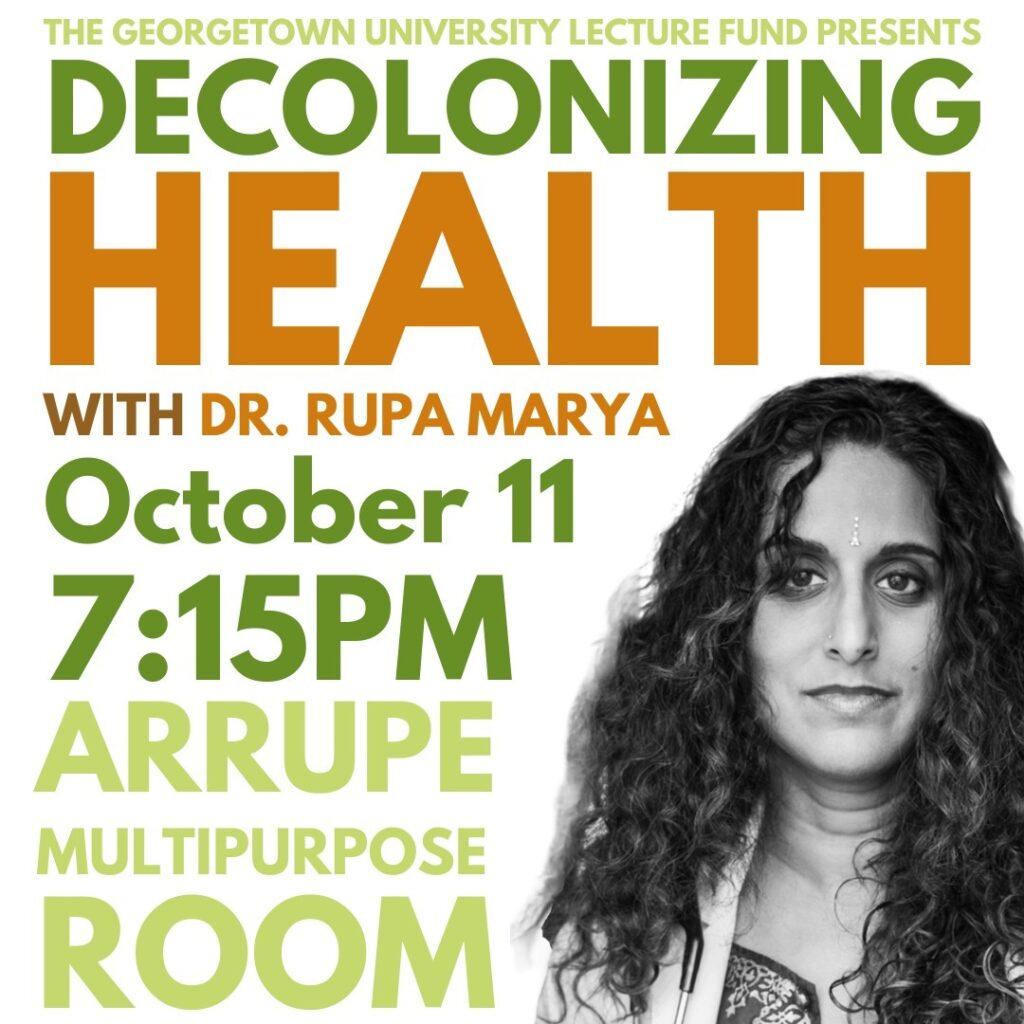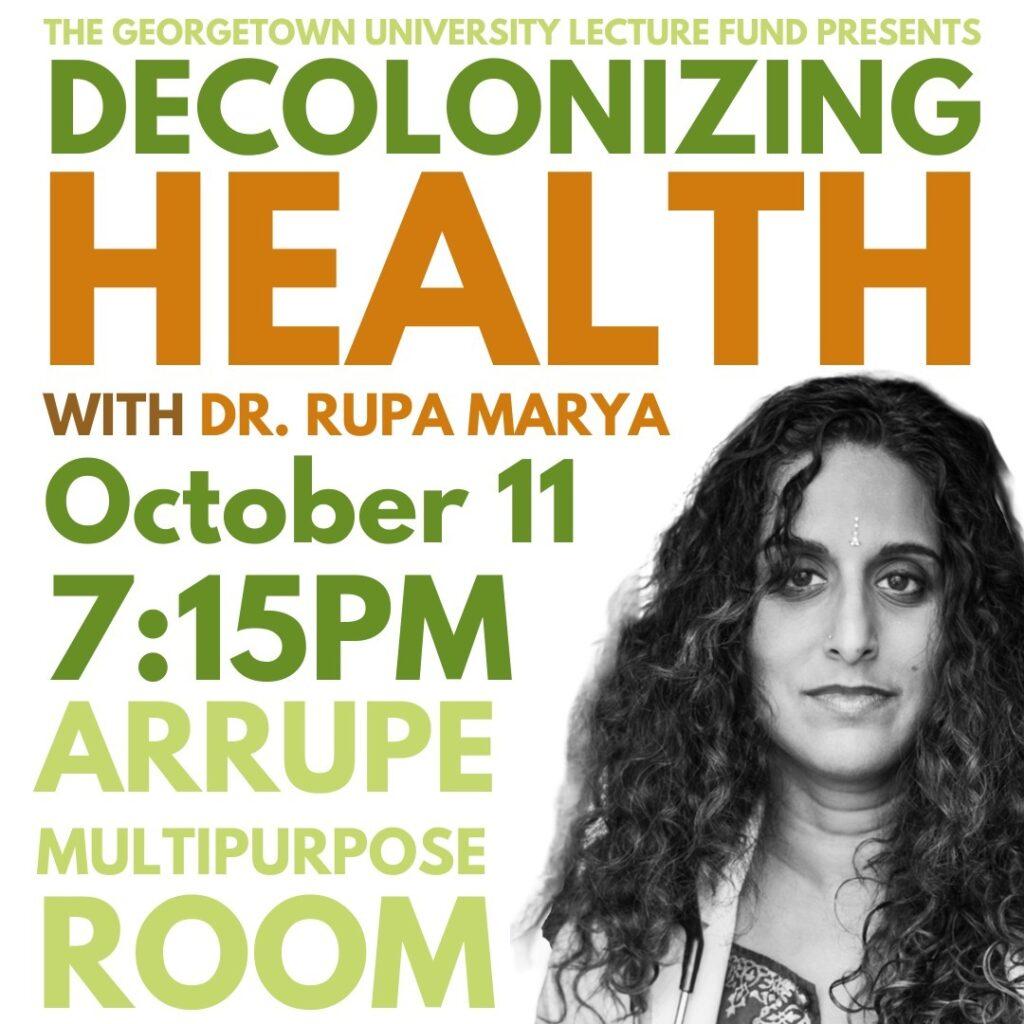Dr. Rupa Marya (MED ’02), a physician, associate professor of internal medicine and hospitalist at the University of California, San Francisco (UCSF), spoke to Georgetown University students Oct. 11 about the importance of decolonization in the medical system.
Marya, a health activist who champions equity-based approaches to medicine, is the faculty director of the Do No Harm Coalition, a UCSF health workers and students organization committed to ending racism in medicine. Marya also founded the Deep Medicine Circle, a nonprofit that seeks to decolonize food and medicine in California. The event was moderated by Sarah Bosha, the director of the Capacity-Building Initiative at Georgetown’s O’Neill Institute for National and Global Health Law.
While visiting Georgetown, Marya spoke to students about her new book, “Inflamed: Deep Medicine and the Anatomy of Injustice,” which examines how structural inequality predisposes marginalized groups to poorer health, outcomes and care. The talk, which the Georgetown University Lecture Fund hosted, also highlighted the value of the “deep medicine” of decolonization, or analyzing the social and historical structures that influence medical issues, to the wider community.
The decolonization of health has been a relatively recent topic of discussion, specifically following the COVID-19 pandemic. It emphasizes the liberation of oppressed communities through health care systems by taking power away from for-profit health care systems and giving it back to those being treated. Consequently, these systems cannot take advantage of their patients.
Marya said it’s necessary for health care workers to actively join the decolonization effort to improve health care for all, especially for groups like indigenous and Black communities who have been historically oppressed. Learning in the communities where health care is often needed will allow for better care, beyond prescriptions and the Western standards of medicine.
“These kinds of dynamics of who knows what and how and where that knowledge is situated, is a part of the decolonization of medicine,” Marya said, referencing the doctors and health care systems. “I don’t think in medicine it would be so much a violent upheaval, but inversion of power is critical, learning from below is critical, following the leads of those who will teach you, if you give yourself to that service is part of that decolonizing work.”
Bosha said it is important for students at Georgetown to learn about the legacies of colonialism in healthcare so that they can make a positive impact on global health systems if they become policymakers in the future.
“It’s important for the future leaders of global health to be thinking and reflecting on what decolonization and concepts such as deep medicine are, and how they impact the provision of healthcare,” Bosha wrote to The Hoya. “Additionally, for students thinking of any leadership role in policy and law making, a decolonization lens is essential to ensure that policies and laws are responsive to the needs of all communities.”

Marya defined deep medicine as caring for the health care of a population by changing the environment and social systems. Together with the book’s co-author, Raj Patel, Marya constructed this definition from the field of deep ecology, an environmental philosophy that values all life intrinsically and advocates societal restructuring.
“Deep medicine doesn’t center around an individual,” Marya said at the event. “It’s not about telling you to diet and exercise your way out of structural determinants of health. You can’t do that. You have to actually change the structures to change the outcomes.”
Marya said the structural determinants of health, such as education, housing conditions or work environment, can influence a person’s health just as much as their genes, if not more. She said that similar to how the genome determines whether a person is at risk for certain diseases, a person’s exposome — the collection of environmental factors a person is exposed to throughout their life — plays an even bigger role in a person’s wellbeing.
“When you look at the genome, that doesn’t predict the onset of chronic inflammation the way that the exposome does,” Marya said.
Marya said despite the popular belief that health is a reflection of personal choices, the effect of institutions like structural racism, housing inequality or industrial pollution have a far more severe effect on the overall health of the population.
“The rate of diabetes around the world going up is not just billions of people making bad choices.” Marya said. “This is not about individuals making bad choices. This is about structures and systems that create damage, creating a toxic exposome.”
These structural systems create greater risks of illness in impoverished communities. According to the National Diabetes Audit, the 20% of adults who have the lowest income have a 77% larger chance of having Type 2 Diabetes in comparison to the 20% of adults with the highest income.
Marya said one way to combat the legacy of colonialism in medical care is for health systems to prioritize community involvement in the practice of medicine. She hopes that by teaching health care students about the colonial origins of structural inequity in health care, students can pave the way for a more socially, politically and culturally conscious form of medical care.
“I would make every first year of medical school embedded in the communities where the medical school is happening and where medical students are learning first and foremost from community members as teachers,” Marya said. “The students would learn from the sociopolitical environment through the lens of the people that are most harmed first.”
Bosha agreed that Marya’s call to action for medical students, health care workers and society could revolutionize medical care.
“If medicine were to be taught in this way, it would transform the practice of medicine, reaffirming autonomy, humanity and respect of individual identities of the patient, and introduce more equity within health care systems,” Bosha said.









